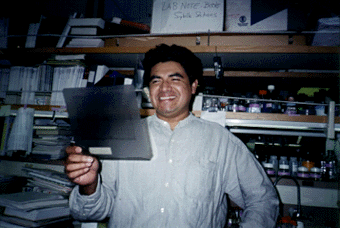![[Currents header graphic]](/homeart/currents_header.gif)
![[Currents header graphic]](/homeart/currents_header.gif)
January 5, 1998

|
|
Ph.D. candidate Manuel Osorio, at work in the lab
|
Whether from television, a visit to a doctor, or a trip to the local emergency room, most Americans catch a glimpse of the world of medicine at an early age.
Yet few people get to see the basic research that gives medicine its foundation. This lack of exposure is one of the factors that drives many minority students with interests and talent in the biological sciences to become doctors rather than researchers or academics.
"The whole idea of a college career, of being a professor, of doing research, is not something that many students--especially those whose parents have not gone to college--think of doing," said Barry Bowman, chair of the Biology Department.
Bowman directs UCSC's Minority Biomedical Research Support Program (MBRS), which opens up the world of research to students whose ethnicities are underrepresented in the nation's scientific labs. The program is funded by the National Institutes of Health.
In February, Bowman plans to apply for a $2 million renewal of the MBRS grant: enough to support 15 undergraduate and eight graduate students for four years.
"With the renewal of the grant, we'll be able to involve more students and more faculty in our program," said Bowman. He and Bernice Frankl, the MBRS program coordinator, expect to find out this spring whether their grant application is successful.
At UCSC for the last two decades, the MBRS program features eight weeks of summer research training in which participants are introduced to lab research, science faculty, and each other. After the summer session, the students are invited to work in the lab of a faculty member and become an active part of a research team. Often the students publish articles in leading science journals as their research progresses.
The 12 undergraduates and two graduate students currently in the campus MBRS program are involved in many different projects. Their work includes examining how cells pump acid through their membranes, identifying possible antitumor molecules in marine organisms, and investigating how cells assemble antibodies.
Cietta Penn, a graduate student in molecular biology, said her experience in MBRS as an undergraduate influenced her to stay at UCSC to pursue her master's degree.
"The program opened a door for me and introduced me to research," said Penn. "I got really interested in what I was doing, and wanted to stay on and complete the work I started with my bachelor's degree." Affiliated with biology professor Frank Talamantes's laboratory, Penn is currently studying how hormones carry out their actions within cells.
It's not always easy to guide a student toward an academic or research career, but MBRS has enjoyed some success.
Out of 500 minority students who have participated in MBRS and Minority Access to Research Careers, a similar program at UCSC, 28 have received Ph.D. degrees and 20 are currently in Ph.D. programs, Bowman said. An additional 110 have earned M.D. degrees and 20 are currently in medical school.
Dr. Martín Martín took the lessons he learned from the MBRS program and integrated them into a career that mixes both research and clinical practice. In addition to caring for children with liver and intestinal problems as a physician at the UCLA Medical Center, Martín spends much of his time in the laboratory.
"Significant advancement in pediatric care in the future is going to come from our understanding of basic science," said Martín, who earned a bachelor's degree from UCSC in 1980. "MBRS introduced me to research. Without the program, I probably would have gone totally into patient care."